The Dead Insects - A Photographic Study (MACRO) series, ongoing
The Dead Insect Collection
As part of my investigations into the natural world, I've been collecting and periodically photographing a growing collection of dead insects for about the last seven years. I started collecting the empty shells of spider lunches from windowsills along a corridor in our old studio and they were fascinating. Often still semi-wrapped in silk they were mummified shells of dead creatures.
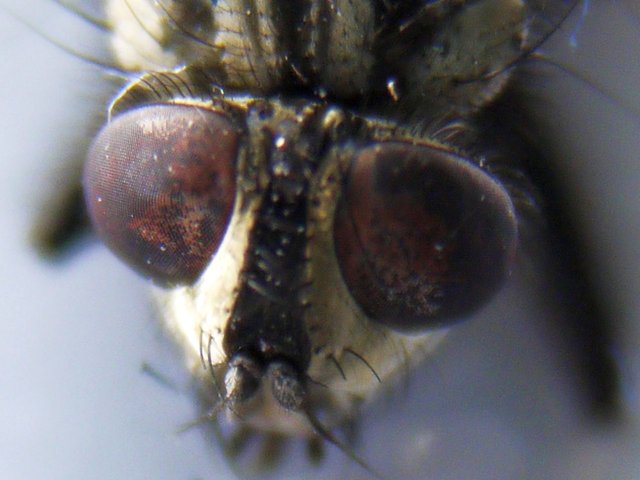
Extreme close up of compound eye and navigational hairs, essential for a fly's precision flight 1/60th f n/a ISO 400
Durable Chitin
With an exoskeleton of Chitin on the outside they slowly degrade and break down over time. A few spiders have also made it into the collection. Although not strictly insect they are included as part of the miniature ecosystem they are an integral part of. I keep collecting and people often drop by with a perfectly preserved dead bee or fly to add to the collection. They are sometime left on my desk as anonymous offerings. I have my favourites among them. The very bottom picture is of one of them. An exquisite lacewing which in life is a very bright green colour with transparent wings and the appearance of golden eyes.
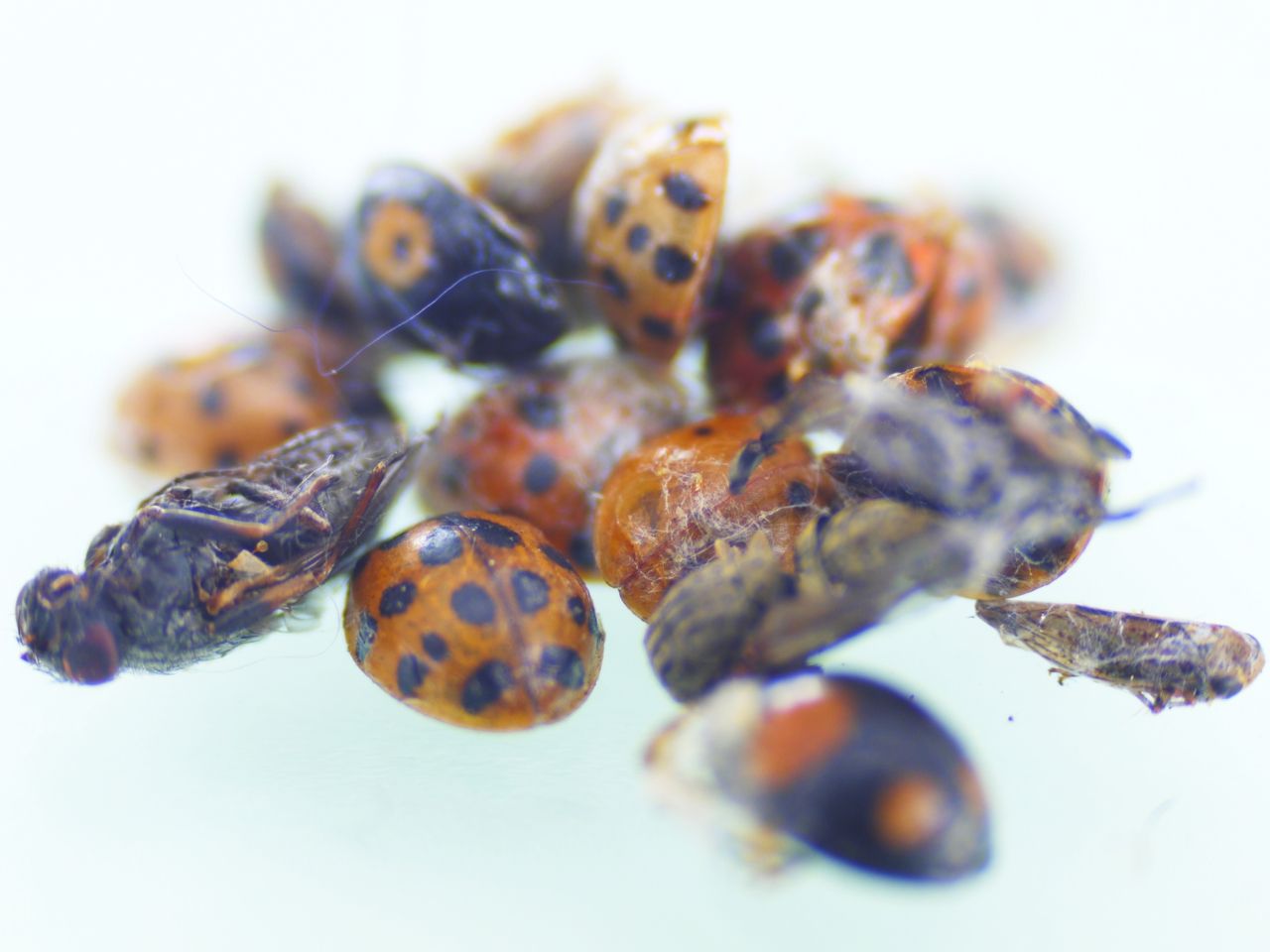
Assemblage of Ladybirds and flies on ground glass background 1/13th ISO 200 (no f number available) - manual lens
Death
For me the collection and it's periodic study by macro photography offers a chance to reflect on our attitudes towards death, dying, dead bodies and decay from an objective perspective. Because they are insects nobody had relationships with, we can look at them for what they are. They don't rot so instead of a pile of goo, we have what are in effect skeletons, except they retain the features our own bodies do not. Eyes, hairy legs. They breakdown slowly over time. wings fall off, legs break, bodies become detached from heads.
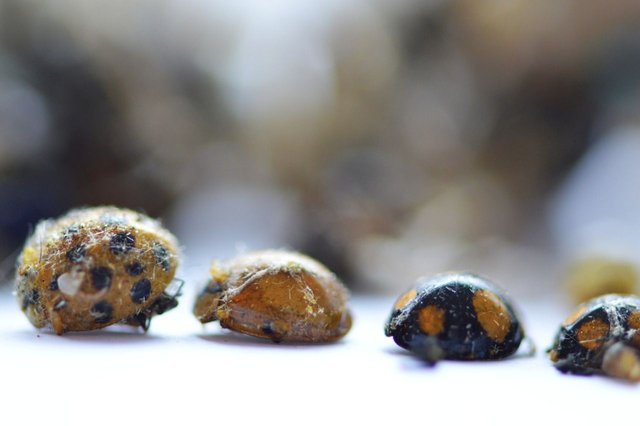
An Arrangement of Ladybirds in single file 1/60th @ f4.2 ISO 800
Tableaux
When I photograph the insects I pour them out of their sarcophagus (a sweet box) labelled JED's DEAD INSECTS which is safely stored in my desk and I set them up, separate them for visual effect or just leave them jumbled or assemble them in piles.
Political
The jumbled pile of bodies does make me think of the many tales of genocide from our own recent history and I consciously communicate a feeling of that, if perhaps more to myself than as a primary goal. My own reaction to the inhumane concept and vision of what is often euphemised as ethnic cleansing can be explored from a detached way through the work; the mass slaughter, dehumanisation and denigration of entire peoples is a powerfully emotive subject and this is partly a way of tackling something essentially very human and shamefully immoral, through the veil of studying other species. It's not something that I thought about consciously until I saw the bodies at a macro scale but when I did, I always think about them partly in this context, although I would also add that no insect has ever been harmed for this project, they are all dead when I find them and they are treated with as much dignity as I can offer them.
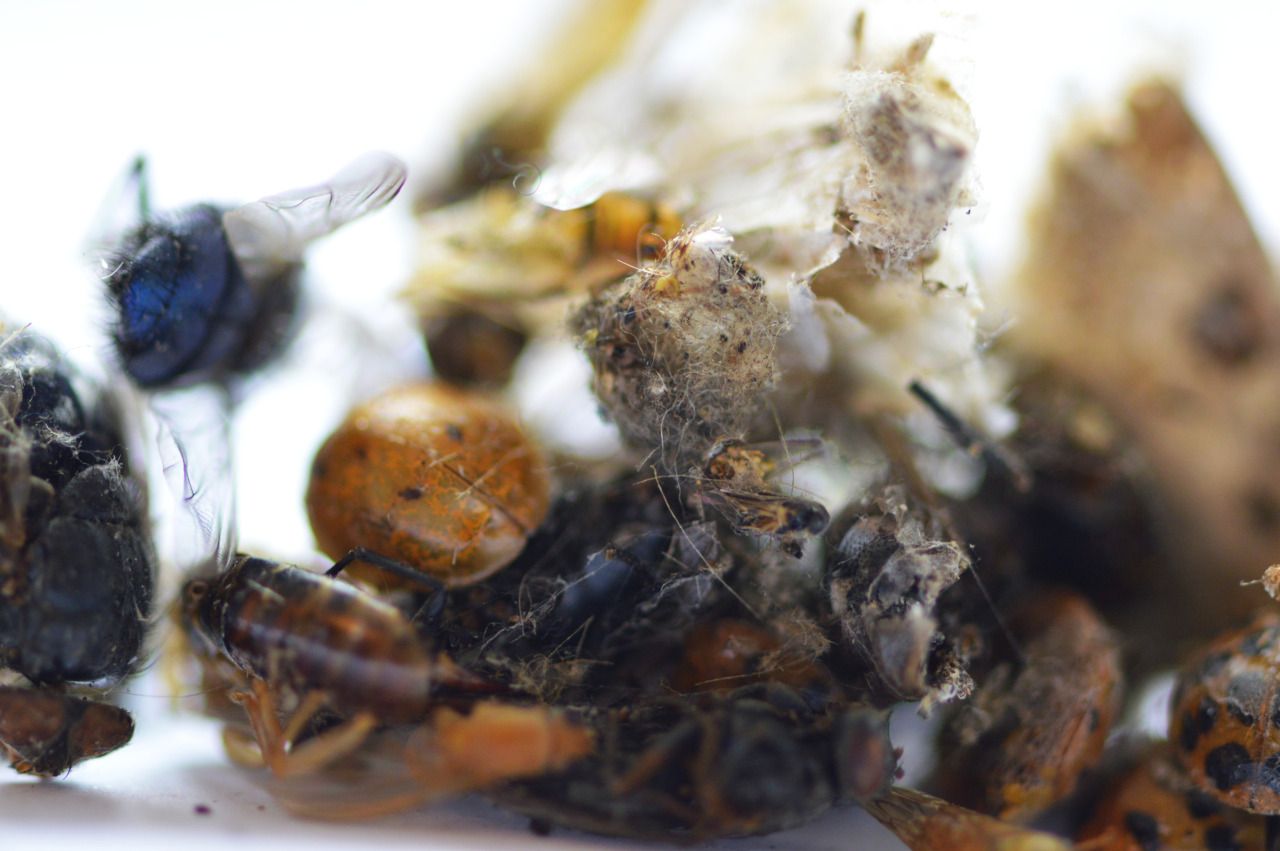
Assorted insects in a pile at different angles including a bluebottle, a decomposed moth and assorted Ladybirds 1/40th @ f4.2 ISO 800
Influence & Inspiration
My next door neighbour of 12 years and friend; the Late, Great Godfather of Auto-destructive art Gustav Metzger influenced my thinking around art. Gustav died recently and I dedicate this post to his phenomenal existence and prodigious work. He was a survivor of Auschwitz and he was brought to the UK as one of the kindertransport as a child, without his family. His work was all about destruction and it was also a reflection and reaction to 20th century values of destruction of the environment. So for me, the Dead Insects in their own dignified way are a reflection of my relationship and proximity to one of the late 20th Century's Great Artists.
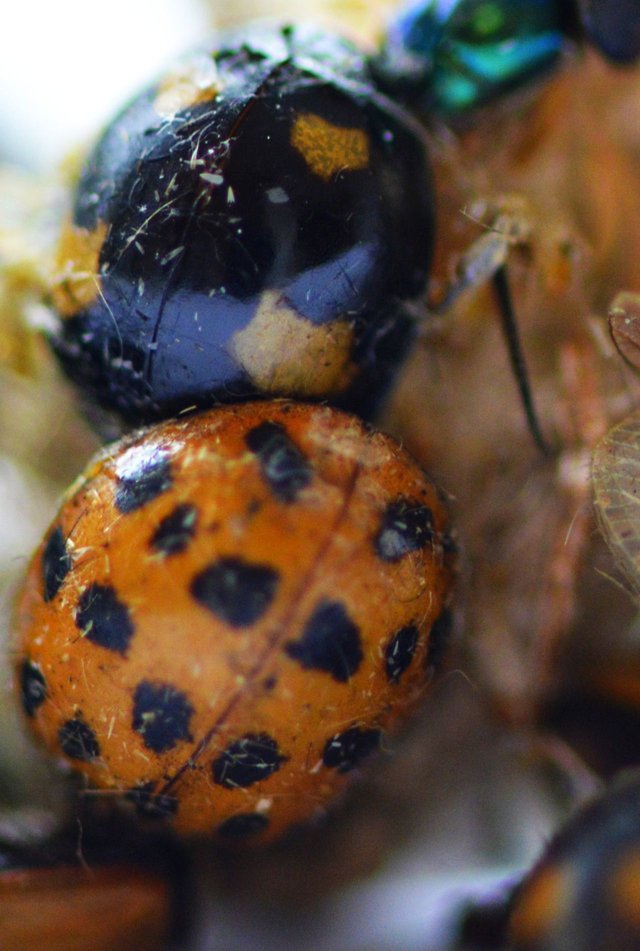
Extreme close-up of two Ladybird species shells covered in small fibres otherwise known as dust 1/50th @ f4.2 ISO 800
Ongoing Study
The collection is photographed at different times, periodically. Some will breakdown in storage and transit, others will join the collection. Over time the character changes and some are more durable than others. Beetles are tough and stay well intact as do the more sturdy flies and bees. Smaller flies, Spiders and moths tend to fare less well over time and the collection ends up with spare wings, antennae and legs. I think I will always have this project as an ongoing active work. Some people express revulsion and horror when I tell them about it. Others find it fascinating.
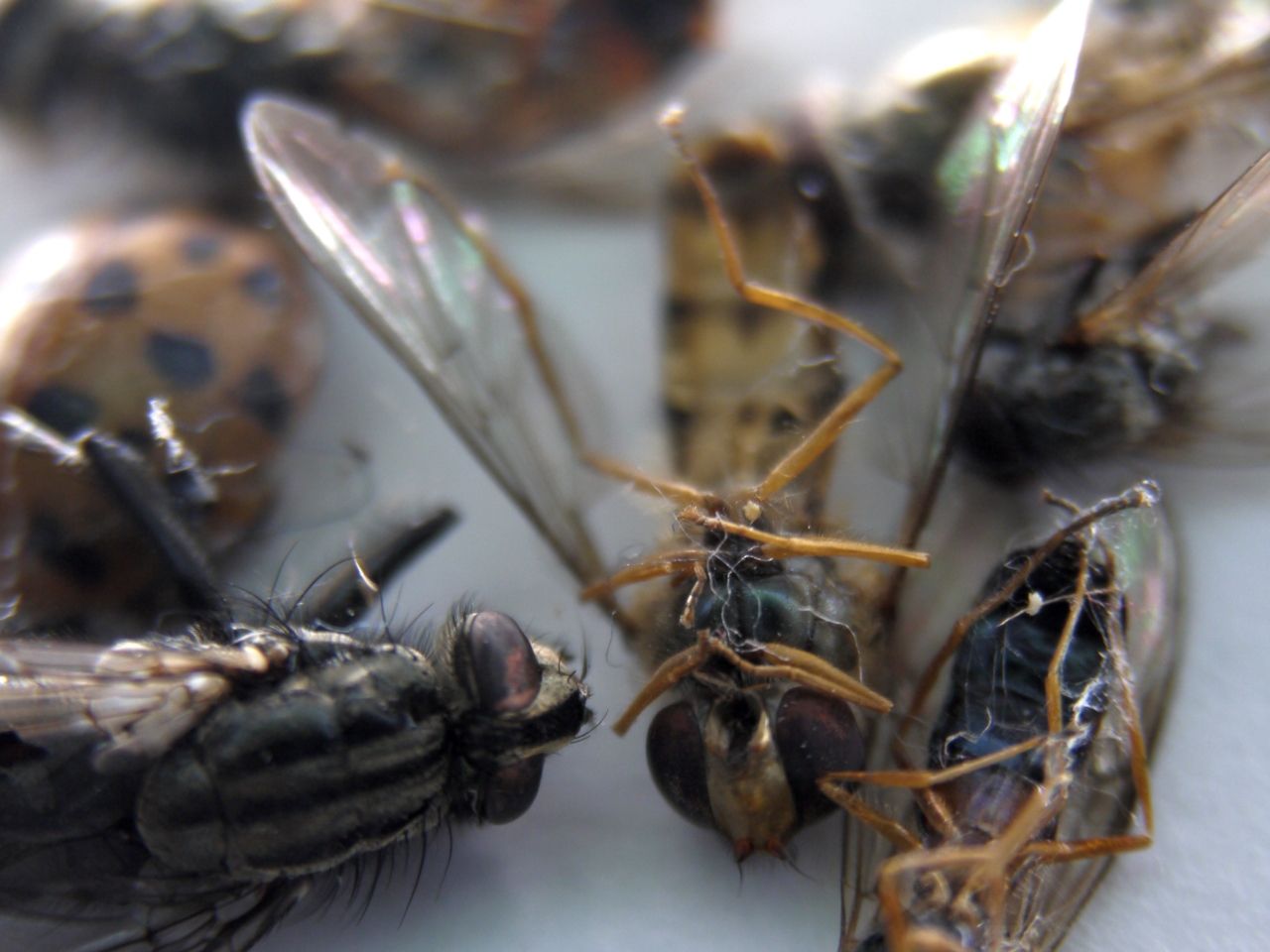
A hover fly with wings in flight position between a blowfly and another hoverfly with wings tucked back 1/60th @ f/na ISO 400 (manual lens)
Art ?
Like all art, our reaction to it often tells us more about ourselves than the artist or the work and perhaps that is art's great truth. People would argue that photography is not art. I would add a caveat that arranging dead insects could be construed as conceptual, transient sculpture and that photography is a way of recording it. Except I think photography can be a wonderfully expressive art form in the same way Duchamp made a urinal art, anything is and can be. Art is about thinking, not brush and pens. It's about the mind, not the toolbox. It's about humanity and the human experience, not arbitrary rules made by a critic. So fee free to tell me my photographs aren't art and I'll tell you, I don't really care.
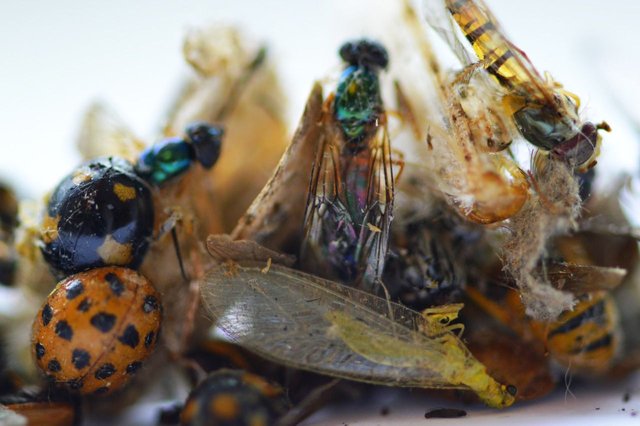
Assemblage of insects brought together in a group tableaux so as to show detail and clarity of form 1/50th @ f4.2 ISO 800
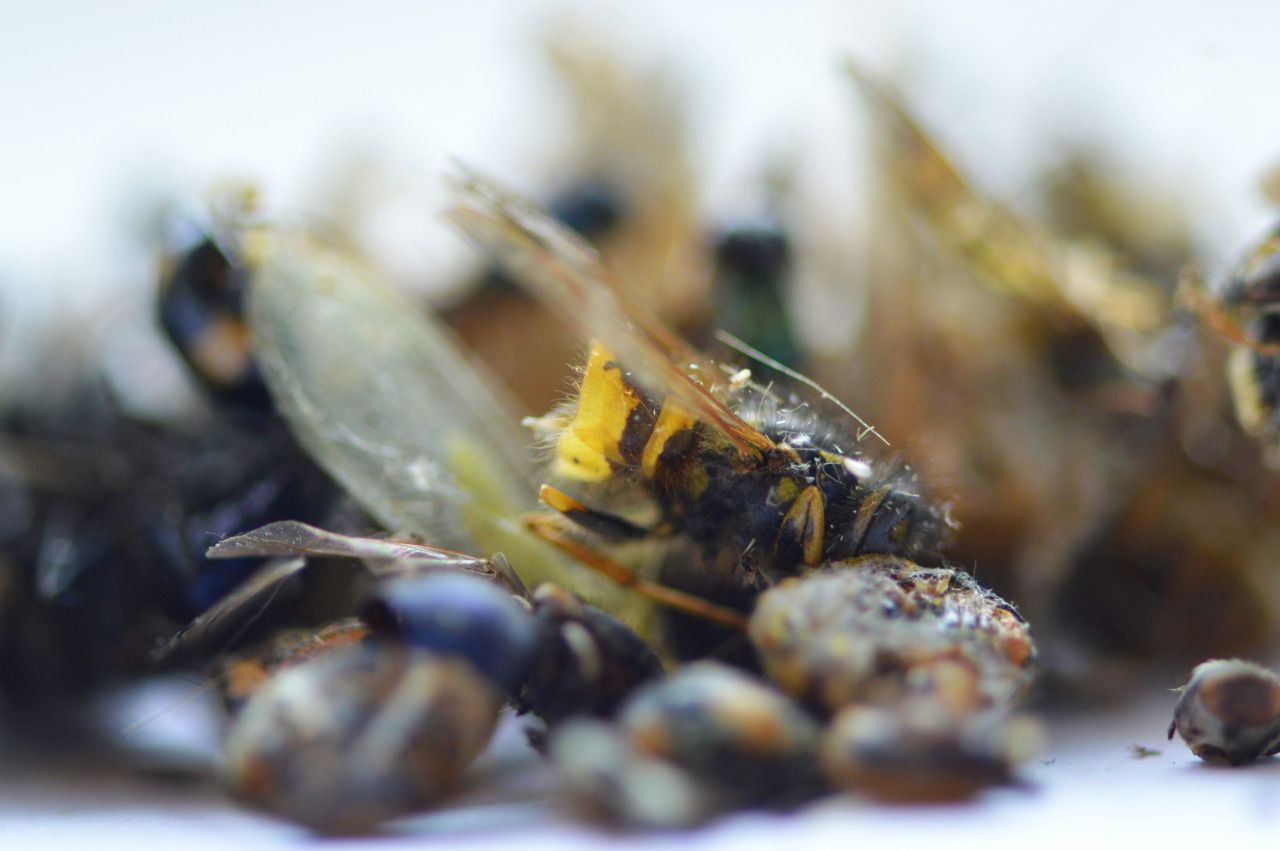
Close-up of half a dead wasp among a pile of indistinguishable forms. The bodies can easily break at the jointed segments. Here the thorax has detached from the jointed abdomen 1/50th @ f4.2 ISO 800
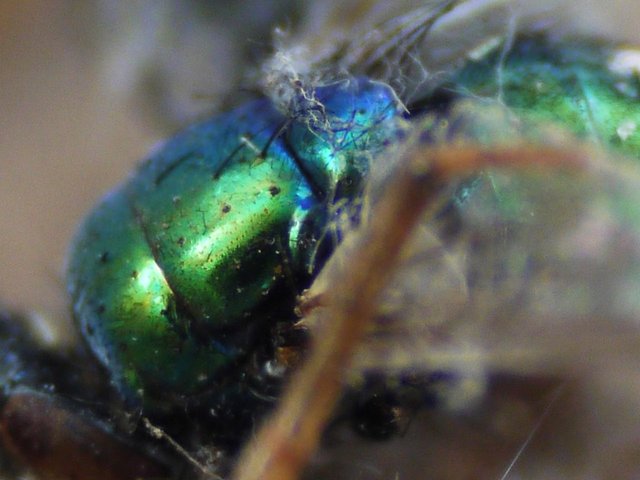
Still Life showing among other features the iridescent surface of a fly thorax creating, rainbow colours due to a special light refractive structure 1/40th f n/a ISO 400 manual lens)
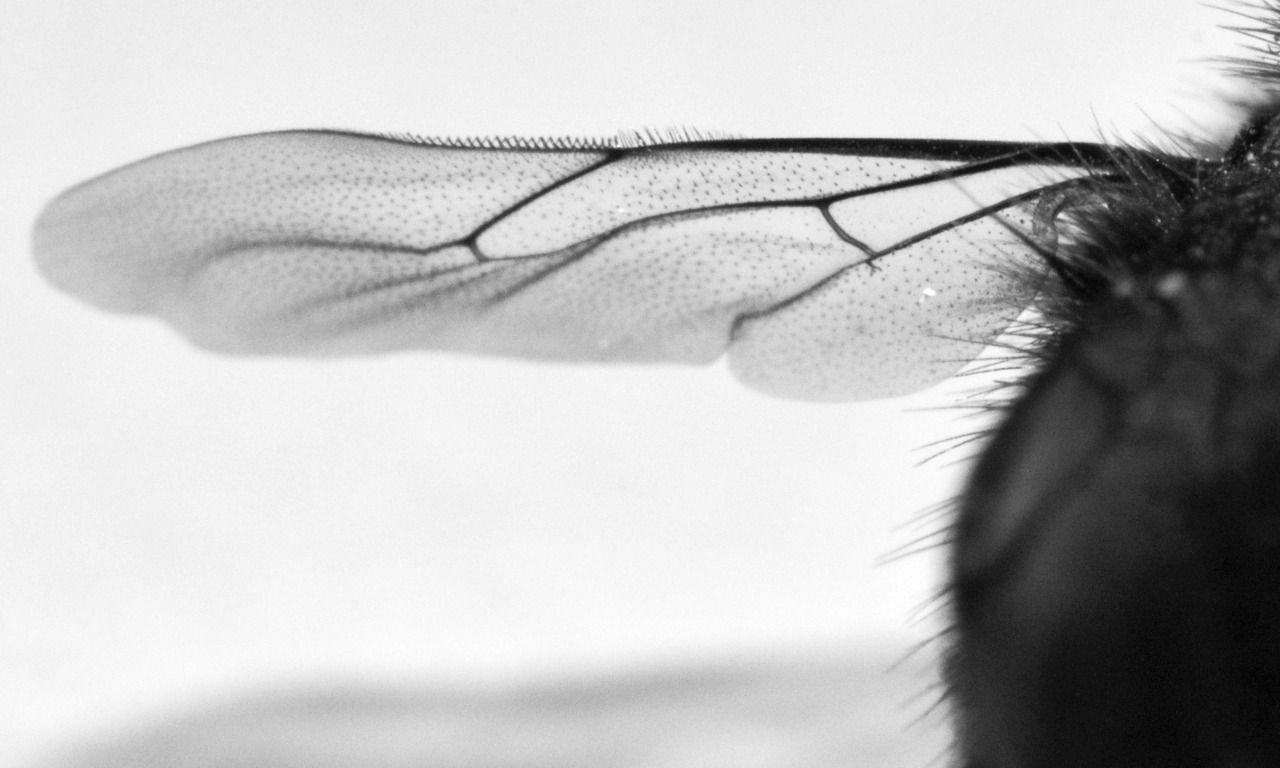
The intricate detailing of a HoneyBee wing. Tiny hairs act as sensors and the tough but delicate veined structure of the wing in close-up. Most flying insects are covered in fine hairs which act as navigational sensors in lieu of soft skin to feel things with 1/25th @ F25 ISO 800
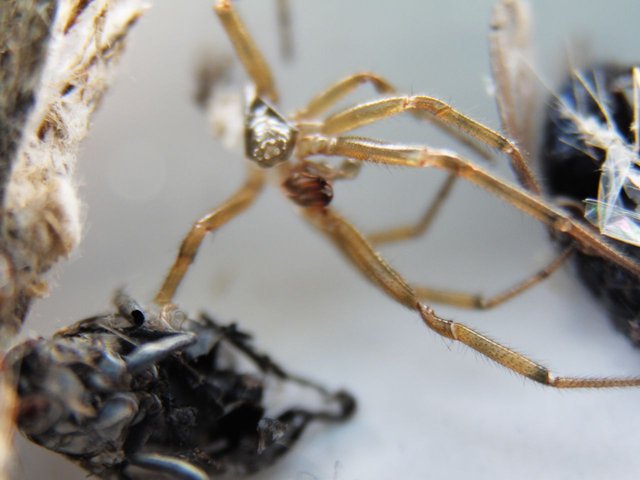
Centre frame here is actually a Spiders moult. Like the crabs they are related to and in a similar way to some insect species they moult their skin in order to grow. This leaves them vulnerable and soft for a while which is why you don't often see it happen
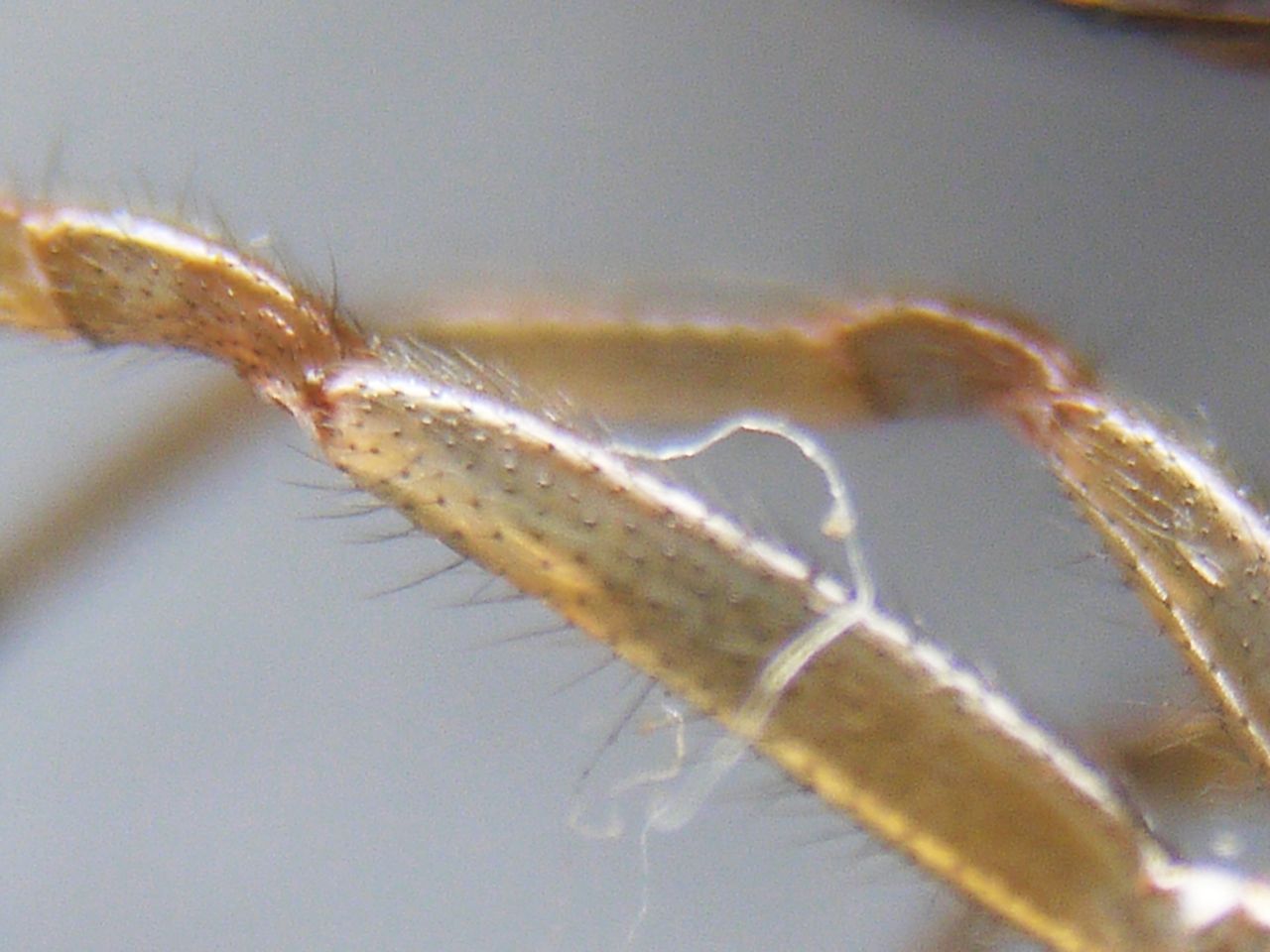
Extreme close up of the spider leg with tiny hairs covering it. These hairs represent our version of the sense of touch in a similar way our hairs tell us about forces acting upon them and it's quite surprising to see such mammalian looking features on a small arthropod so small and seemingly smooth 1/60th f n/a ISO 250 (manual lens)
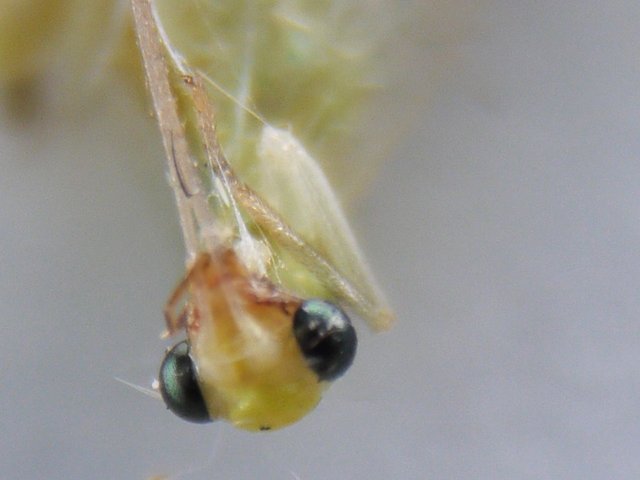
One of my favourites, the elfin looking Lacewing with it's fine features and almost fairy like appearance. I have always been fond of these small insects and this one is a delicate, elegant example among a sometime burly and tough looking group. 1/60th f n/a ISO 200 (manual lens)
Technical
It's been an evolving process and the light quality is important. I have photographed on a ground glass table with excellent results producing an even, backlit frame. Other times I have used white paper to reflect sunlight from my windowsill as in the dead bee. I started off with a 300mm manual lens on my Lumix. The photos with no f reading as the aperture is manually controlled. The other closer shots use a Nikon 105mm macro lens which is a fantastic piece of glass for such small work. The manual lens shots are handheld. The bees wing from a series of portraits of dead bee are from a tripod shot. The others are handheld.
This is quite physical work as you might imagine but something I've got used to doing from shooting macro in the field over many years. I use a small paintbrush to delicately arrange them and always use natural light. Flash photography would create problems with a lot of reflective surfaces. I really enjoy it as a project and it's probably one of my longest running single photo projects. This is a small selection from the various shoots and as you can see each shoot with a slightly different set of models, lighting and environment create a range of imagery.
@lighteye - this is the photo essay I've been saving for a special outing !
I love it
Thank You :)
Interesting
thanks. I hope you have a good read (and get something out of it), It's quite a deep post and there's a lot of information to take in :)
Amazing photography!What lens did you use and how did you get so close to see? Followed and upvoted.
Thanks Stephen.. I used a couple of different lenses on these. (taken over quite a long period) the first one is an old manual Tamron SP 300mm with a sliding macro setting.. very cool and lovingly restored as new, bought from the Lens Doctor on ebay.. Eddie Houston; he was the guitarist in Thin Lizzy (pictured below)
and the other lens is a nikon 105mm macro lens.. a very good glass ! https://www.amazon.co.uk/d/Shops/Nikon-Micro-NIKKOR-105mm-IF-ED/B000EOSHGQ
So very well done!
Thanks TK I've been saving this post as there are so many pics and so much to say about them !
good interesting post
These are gorgeous photos. Thank you for sharing. Death and decay is a beautiful topic and I strive for this kind of feeling in my own art.
Thanks Fallon, I'm pleased you like them. Death and Decay is only an essential part of the cycle of life.. In a way I've intercepted the cycle
Hello @outerground , it's a very nice picture and very beautiful to be enjoyed, everyone would love to see it, blend of colors and nice light make the picture more amazing, do not forget to visit also my page, I also have some good pictures for you @wahyusaputra

Great shots and blog, but UGGHH! At least you did not have any palmetto bugs there. I freeze when I see them! I swear they are as big as mice (a little exaggeration on my part.) They are massive cockroaches that live outdoors and only come inside to find food . Palmetto bug is a euphemism for cockroach! My sone once encase a dead one in acrylic fir a project at art school! I think he even sold it. LOL! Upvoted my penny!
Thanks Di, it's a long running project and I don't have a cockroach in my collection.. Perhaps I'll find one ! I remember my brother encasing dead insects in acrylic.. trickier than it looks. I have a collection of those too :) thank for the upvote.. a vote of confidence is worth everything, no matter what it's arbitrary value is ;)
Conceptually, it's like the still life paintings of the Dutch Masters. They wanted to emphasize the transient nature of life. Your images do that, too.
Thanks Haphazard. That's a great shout. I'm not sure I would have the patience to but wouldn't they make great paintings. I love the realist collection at the Rijksmuseum in Amsterdam.. they didn't have cameras back then did they!
You know what. I never thought of doing this but I just might paint a couple of these up on Canvas !
That would be cool, if you painted some of these. It would be a really evocative color palette, too. Good luck in capturing their fragility!
I did buy some Liquitex acrylics in the Cass sale with a view to doing some painting.. I just never thought of these as subjects before ! nice. If I manage to get round to it, I'll let you know :)
I bet your art will turn out great. You have such a connection with your subject. Happy painting!
thanks dandelion, let's see hey (If I can find some time to squeeze it in)
:D